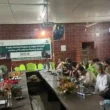“There is no proper residency for foreign students at Karachi University,” said Ahmed Mohammad, a Somali student enrolled at KU’s pharmacy department.
Complaining about not having dedicated cooking and laundry staff at the hostel, Mohammad said performing these tasks consume a lot of time and hinder academic performance.
“I have to cook my own food and get my laundry done,” he said, recalling how he never had to cook for himself back home in presence of his mother.
Ismail Abidi, another Somali student, said that buying food from outside was also expensive.
“I get a fixed amount from home every month and most of that money is spent on food,” he said, adding that he was consuming less food to cut down on his expenses.

The Federal Boys Hostel (FBS), also known as ‘African hostel’, lacks basic facilities. Even though it was renovated in 2015, the conditions inside do not seem to be welcoming for anyone – let alone foreign students. They pay up to Rs24,000 in annual fees for residing in the facility.
“We don’t have sufficient toilets in the hostel. We make queues every morning to be able to use them. Even those present are poorly maintained,” Abidi laments.
Given these difficulties, many foreign students look for off-campus residencies. But that comes with another problem – money minters who quote exorbitant rental rates.
Mohammad shares his hostel room with another Somalian student and has difficulty studying during exams. “We have no library in the hostel where one can go and study. At least there should have been a separate study area,” Mohammad added.
Inadequate hostel facilities, however, is not the only thing that hinders learning, the use of Urdu language during lectures also engenders academic problems.
“Most lectures are delivered in Urdu, making it difficult for us to keep up with other fellow students,” he shared.
Mohammad, however, finds fellow Pakistani students very helpful in this regard, specifically girls. “Female members are generally more helpful compared to our male classmates,” he chuckles.
Syed Ali, a fellow local student, vouches for both the complaints these students have – poor accommodation facilities and the problematic mode of instruction.
“With the exception of the International Relations department, the mode of instruction keeps swinging between Urdu and English,” he said.
He further said these were longstanding issues and had not been resolved despite repeated efforts by the students. “They pay almost three times more fee than us [local students] and are still not provided with basic facilities,” Ali added.
Referring to a protest held by foreign students in 2016, Ali said it largely went unnoticed by the administration and nothing changed.
FBS accounts and admin officer Muhammad Siyaz said that around 100 students were currently living in the hostel. “We have a total of 50 rooms, of which eight are reserved for administrative purposes. A single room houses two students.”
The annual fees, he said, was only Rs24,000 which was insufficient to look after everything. “Food and laundry are not covered in the fees. Students are supposed to manage it by themselves. It only covers utilities – electricity, gas and water supply,” he added.
Siyaz blamed poor hygienic conditions on students. “Even though cleaning staff regularly sweeps corridors, most students litter garbage openly.”
Siyaz is also responsible for receiving and resolving complaints that students face during their stay. “In case of any complaint, a request is sent to the finance department. If funds are available, they forward the request to the engineering department to address it,” he explained
Dahaboo Mohamed, a female student from Kenya, seemed equally irritated over poor living conditions as her male counterparts. She looked a little more infuriated with her overall experience in the varsity so far.
“Toilets are untidy, there is no maid to clean toilets and corridors,” she said, adding that poor maintenance of the hostel building had left it crumbling.
Even a jungle would have been a better place, Mohamed exclaims.
“I feel like an alien in the university. Even my class fellows are not welcoming,” she said, recognising that locals might have problem communicating with her in English.
Audit officer Javed Hameed termed unavailability of funds as the leading reason behind poor hostel facilities for foreign students.
“The existing fee structure does not generate enough revenue to take on all the challenges,” he said, highlighting the need to design a more sustainable revenue model.
By: Sara Rana and Farhan Mushtaq













